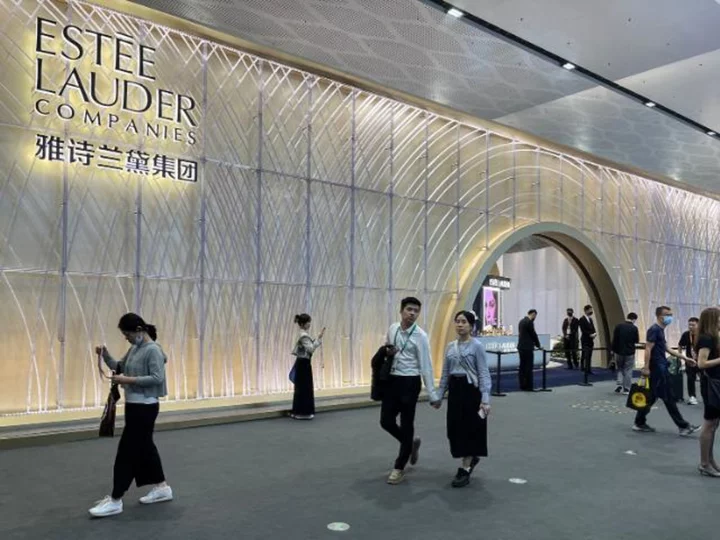China's first few months of reopening to the world hasn't gone as planned for global businesses.
In recent weeks, a slew of blue-chip firms have pointed to a patchy recovery in the world's second largest economy, forcing some executives to warn of slower-than-expected growth.
Last week, Estée Lauder suffered its biggest daily stock drop on record after slashing its sales outlook, citing pressures in China and elsewhere in Asia. Starbucks and Qualcomm have also flagged uncertainties related to the country, which is a top market for both.
Beijing abandoned its zero-Covid policy in December and scrapped longstanding quarantine requirements for international arrivals in January, ending restrictions that had isolated its economy.
The welcomed, if abrupt, policy U-turn led to hopes that China could help propel global growth as it had before the pandemic. Its latest headline GDP growth offered some encouragement, but there are also fresh concerns, such as the job market for younger people and the possibility of deflation.
Shehzad Qazi, chief operating officer of data and advisory firm China Beige Book, said many analysts on Wall Street had overestimated the pace of the country's recovery.
"The idea was that as soon as the zero-Covid policy would be over, the Chinese households and consumers would just go berserk — spending the vast amounts of money that they had been saving up over the zero-Covid and the lockdown period. This was wrong," he told CNN.
"In a way, that was essentially setting up [investors] for disappointment."
As a result, it's getting harder for companies to predict how they'll fare in the coming months.
Shares plunge
Estée Lauder Chief Financial Officer Tracey Travis told analysts last Wednesday of "a perfect storm of higher-than-anticipated volatility."
"Both global external headwinds and uncertainties surrounding the timing and pace of recovery from the Covid-19 pandemic, primarily in China and Asia travel retail," were weighing on the company, she said.
The company, which got 34% of its total sales from China in the last fiscal year, now expects sales to fall between 10% and 12% for the fiscal year ending in June compared to the year before.
Shares of the beauty giant, home to brands such as Clinique and Bobbi Brown, plunged more than 17% in New York last Wednesday.
Starbucks warned last Tuesday that sales growth in China was starting to cool — and likely would continue that trajectory over the next six months.
"We've already seen it start to moderate," Chief Financial Officer Rachel Ruggeri said on an earnings call, referring to its No. 2 market after the United States.
"That's really driven by the fact that there's still some uncertainty in the overall environment from a recovery standpoint, when you look at things like consumer behavior as well as recovery in key segments like our international travel."
Although the company did better than expected in the quarter ended April, enjoying a strong rebound in traffic and "faster-than-expected recovery" in its second biggest market, investors were left unnerved.
The beverage giant left its guidance for the rest of 2023 unchanged, which discouraged shareholders. Starbucks' stock fell 5% Tuesday following the presentation, and 9% the following day.
The company's outlook clouded its "strong momentum," Andrew Strelzik, a restaurants analyst at BMO Capital Markets, later said in a note.
Last week, while reporting earnings, Qualcomm CEO Cristiano Amon said there was a broad expectation that "the China market was going to bounce back" soon after reopening, but "we have not seen those signs yet." China is its top market, ahead of Vietnam.
Procter & Gamble, the world's largest consumer products group, said it was still waiting on "further recovery" as some Chinese consumers appeared to be wary about going out and returning to normal life.
On an earnings call, CEO Jon Moeller said a recent visit to the country had left him cautiously optimistic.
"I think it will be a little bit choppy," he told analysts.
A gradual recovery
To be sure, there are some optimistic signs in China.
The country's economy expanded by 4.5% in the first three months, marking a solid start to recovery efforts.
Economic data is starting to show a sense of "revenge spending," a term used by analysts to refer to the unleashing of pent-up demand, taking off in China, said Qazi.
Last week, China's annual May Day period, a five-day holiday, served as a good example, with the number of trips surpassing pre-Covid levels for the first time in years. However, spending during that period was only slightly higher than the 2019 level, suggesting people want to travel but are watching their budgets.
Marriott, the world's largest hotel chain, says revenue generated per room in mainland China has now "fully recovered" to pre-pandemic levels.
This is mostly based on strong domestic demand, not the return of international travelers, according to CEO Anthony Capuano. The company expects more demand from foreign visitors later this year as flights to and from the country increase.
The luxury fashion industry seems to be faring better, too.
Kering, the owner of Gucci and Bottega Veneta, reported a return to growth for its Asia Pacific business in the first quarter, based on a "gradual recovery in China" and a sharp rebound in Hong Kong and Macao.
LVMH has also reported strong first-quarter sales, and cheered what it called the "spectacular" return of Chinese tourists.

